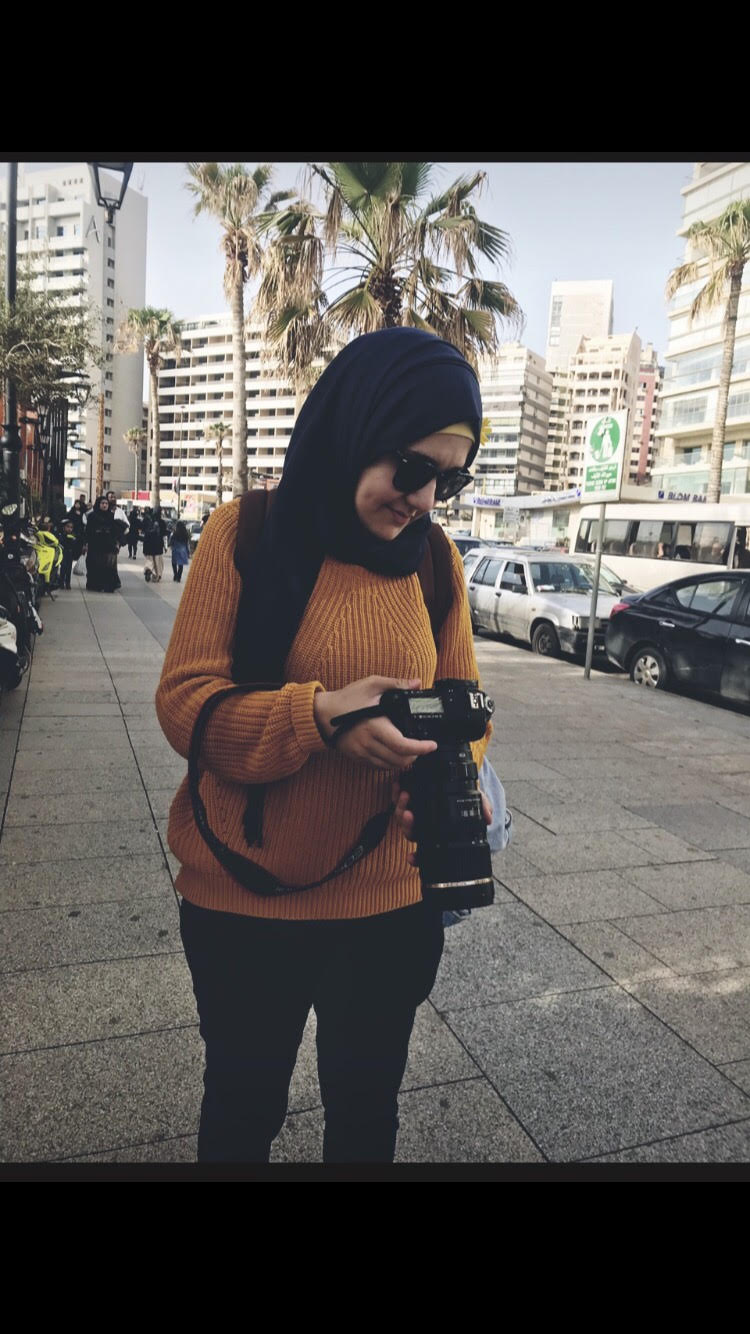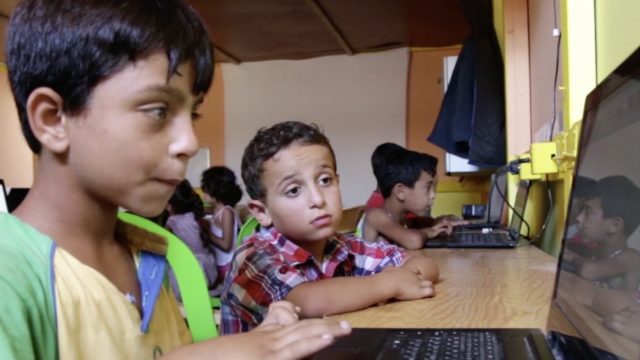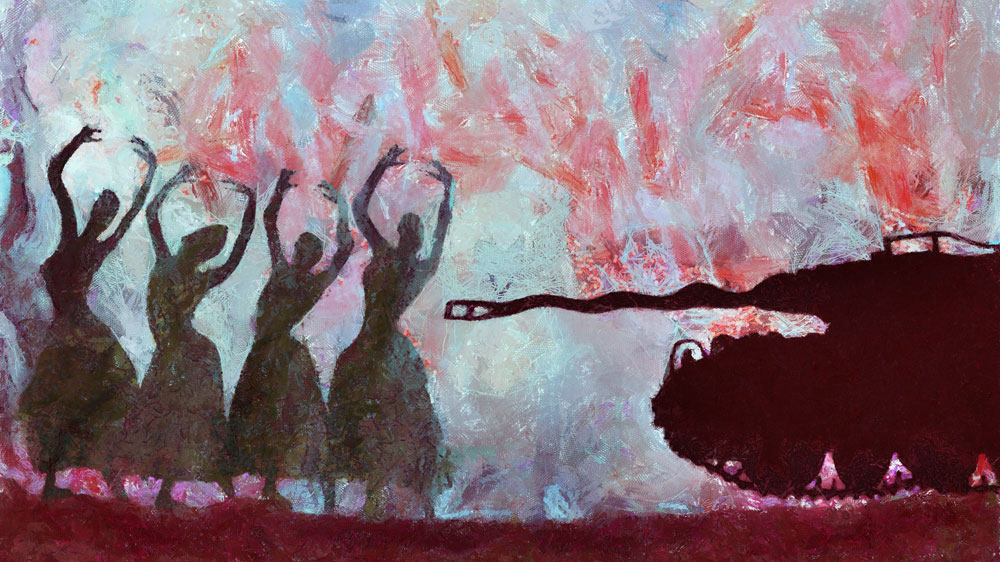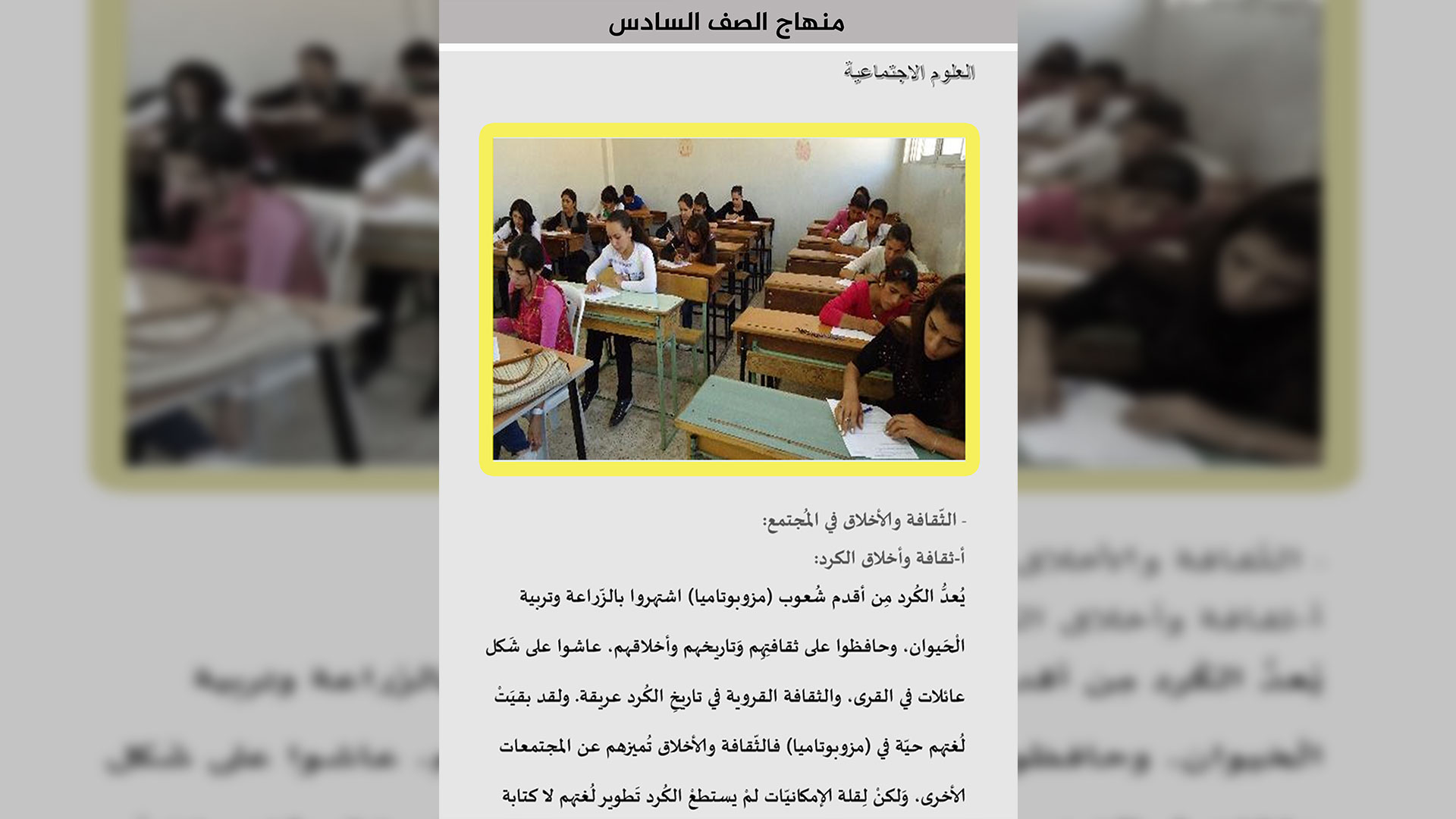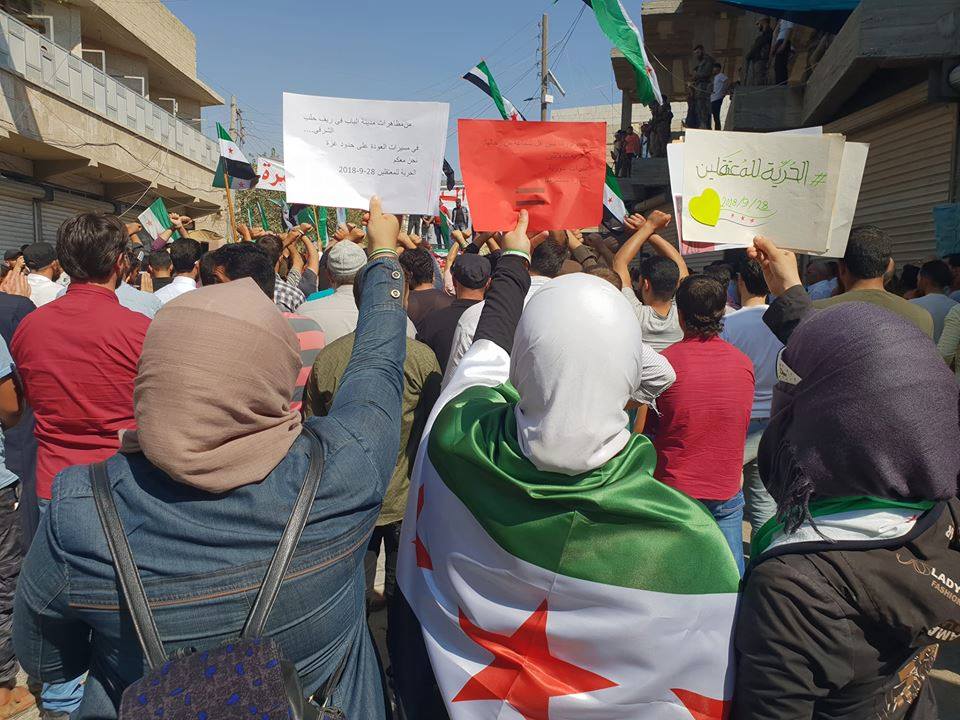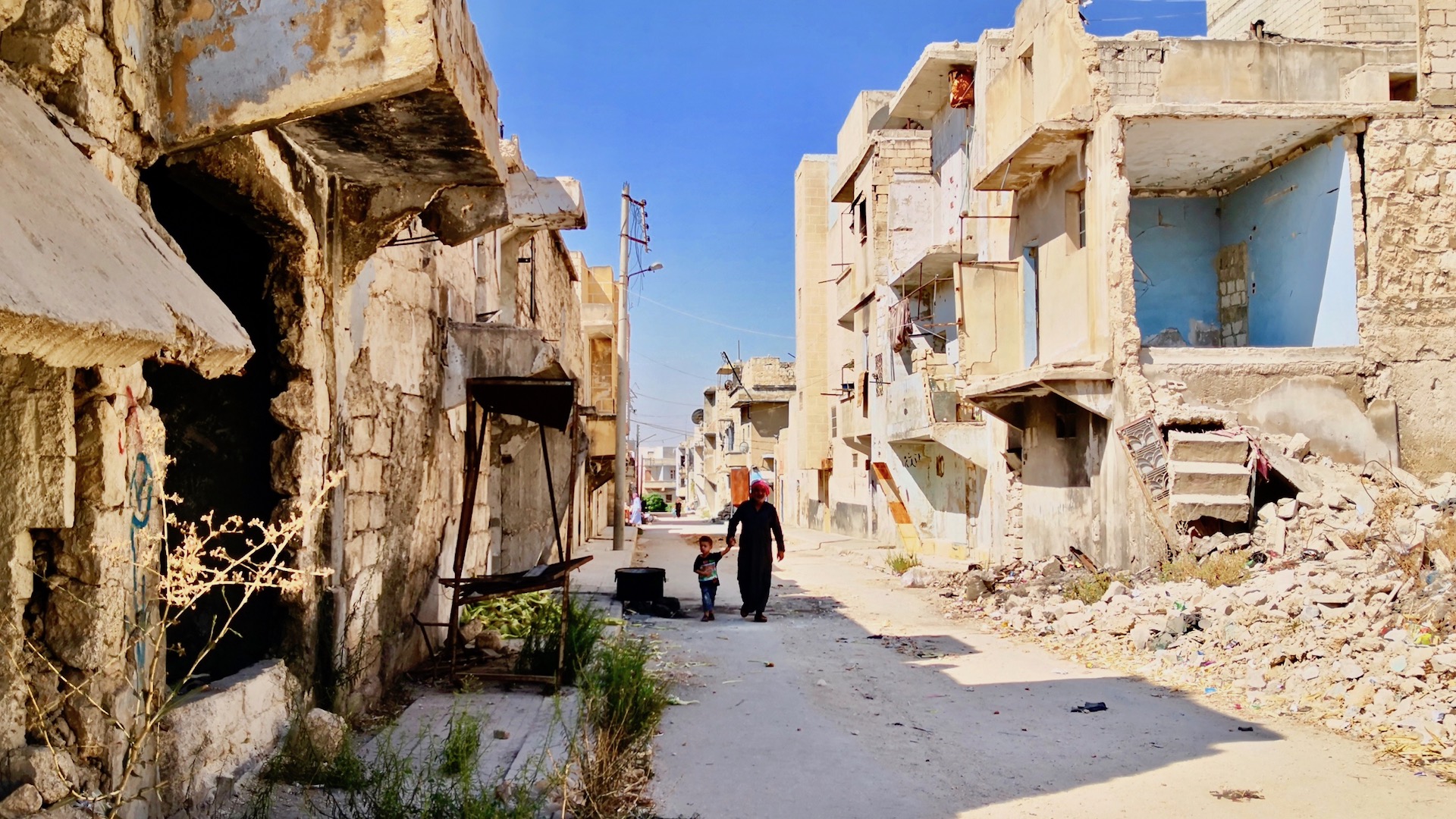This article is published as part of the "Syria In Depth" project, in collaboration and partnership with International Media Support, the Guardian Foundation and SyriaUntold.
BEIRUT: “For the sake of tarnishing my reputation and that of other Syrian women, they accused me of prostitution simply because I participated in the protests supporting the rights of refugees in Lebanon,” said Dima Bsaiss, a 31-year-old Syrian woman who had to leave Lebanon in search of any safe haven due to the harassment.
After obtaining a protection visa, Dima arrived in France with her child.
And yet she hasn’t forgotten the dangers closing in on her back in Lebanon, dangers that emerged just because she was a woman.
Hoping for change, Dima had participated in the peaceful protests in the streets of Syria in 2011. But by 2012, Homs was already a wreck, and Dima was being summoned for interrogation several times by the notorious security branches over “accusations” that she was participating in public protests.
Shortly afterwards, Dima he and her child left Syria.
Because of my political activism, I face direct threats.
Carrying her dreams for political change with her, from Syria to Lebanon’s Tripoli, Dima there continued her activism and advocacy.
She faced security risks from the Syrian regime and its supporters there, Dima says, while displacement also took its toll on the family, on their health and psychological well-being.
“My finances and health were not the only matters at stake. My child Ward, who was only 11 at the time, was also threatened with abduction,” she explains.
Dima worked in schools for Syrian refugees in Tripoli and hoped to contribute to building a better future for them, as she saw in those kids her own child. But the “lamentable situation” at school prompted her to expose corrupt practices, involving the teachers and curricula, through the media.
She gave a journalist several pieces of evidence—including videos of the teaching staff beating students violently as well as documents revealing the administration’s manipulation of salaries by paying partial amounts and stealing the rest. The documents led to the school being shut down, the students moved to better schools.
“My quest against corruption bore fruit,” Dima says. “But my hopes to change reality did not fade away: I took up social work and work on rights, attending conferences and meetings about Syrian affairs—especially those concerning women and children. My circle of contacts widened, and I formed a communication network with journalists and rights activists.”
“But because of my political activism, I face direct threats,” she tells SyriaUntold.
Fabricated photos of her were posted on the Internet intended to blackmail her, Dima says, on top of threats that she received by phone and social media. Other threats included offers of marriage and dating propositions.
"A friend told me out of the blue that there were inappropriate photos of me in one of the Syrian groups. I could not contain my anger, and when I signed in to check, I found out that a person was trying to provoke me by altering photos from my personal accounts and putting them on indecent images to force me to meet him.”
The threats negatively affected Dima’s work and financial situation because she could not accept certain jobs—like those that required transportation in Lebanon or crossing military checkpoints. She started to seriously think about moving to another country, somewhere that would guarantee her rights and offer her family protection.
The Challenges of Education For Syrian Children in Lebanon
12 October 2018
‘Change your address’
Dima turned to the UN to help her seek asylum in a European country, but they only advised her to change her address. She contacted other organizations to put pressure on the UN, and finally succeeded in seeking asylum in France through an Italian organization.
Dima believes that there is direct pressure to reduce or eliminate the presence of Syrian journalists and activists in Lebanon for no clear reason.
“Freedom of expression has become a luxury in Lebanon, especially on social media,” she explains. “Many rights’ activists are afraid to speak about the problems facing Syrian refugees in Lebanon.”
Syrian refugees in Beirut describe similar experiences.
Some of them left the city, while others stood their ground only to still encounter racist statements aimed at refugees, often from politicians and other figures affiliated with the Lebanese government. Most recently, Lebanese President Michel Aoun talked about Lebanon’s ongoing economic crisis, claiming that Syrian refugees had cost the country some $25 billion. President Aoun added that Lebanon has the right to redeem some of that amount from countries that supposedly triggered the conflict in Syria.
Several statistics have documented the economic impact of Syrian refugees' presence in Lebanon, and the money that has been injected into the Lebanese economy as a result.
The Issam Fares Institute at the American University of Beirut released statistics in January 2018 highlighting various facts and figures about the displacement of Syrian refugees crisis, finding that “every $1 spent on humanitarian aid has a multiplier effect of $1.6 in the local economy.”
“As such,” the study stated, “the $1.258 billion of humanitarian assistance that was provided to Lebanon from 2011 till early 2017 actually injected $2.01 billion into the Lebanese economy.”
I suffered physical and psychological problems due to the torture and conditions in jail. [And] after the news spread on social media, I grew worried that I had put my parents in Syria at risk.
Even so, anti-Syrian security campaigns have targeted Syrian activists and journalists of both sexes in Lebanon.
Ahmad Khoder, 29, from the village of Houla in Homs province, recently moved to Italy after securing his exit from Lebanon as political refugee through an Italian rights organization.
During time stay in Beirut, Ahmad was arrested by the Lebanese army after a passenger on a bus saw him watching the video of a Syrian song—Abdel Basset a-Sarout. It later transpired that the passenger was himself an officer in the security forces. Ahmad’s story went viral, and after follow-up on on his case, he was released from prison.
However, Ahmad’s case was still classified under terrorism laws, meaning he was at risk of being handed over to the Syrian regime’s security forces. Ahmad says he “could not help but be scared.”
“I did not know what to expect,” he adds. "Many accusations were thrown at me.”
“I suffered physical and psychological problems due to the torture and conditions in jail. [And] after the news spread on social media, I grew worried that I had put my parents in Syria at risk.”
Even so, Ahmad did not stop his activities, as he participated in solidarity protests on the anniversary of the Syrian revolution in Beirut. Using his connections, he also coordinated campaigns to assist refugees in the camps.
“Jail is a specific kind of challenge, but it did not stand in my way. After I was released, I resumed my activities by posting news about Syrian refugees in Lebanon, including sensitive issues like deportation or arrest—even when that meant seeking help from people outside Lebanon to disseminate the information.”
Imprisoned By The Regime, And Ostracised By Society
07 October 2019
Suffering in silence
Many refuse to speak out about their treatment in Lebanon because of fears it could impact their families in regime-controlled areas, or relatives in prison, back in Syria. At the same time, there are those refugees who believe that it's the family that can sometimes impede women and girls from practicing their activism and expressing their opinions, with families afraid of activism and willing to wash their hands of it. Some go as far as disowning their daughters, if they are arrested or pursued by the Syrian regime.
South Lebanon hosts a whole host of organizations and associations working with Syrian refugees.
Ola al-Jundi is a Syrian activist who works at Women Now for Development, an organization empowering Syrian women, and also supports women politically and teaches at the Gharsa Center in Lebanon's Beqaa Valley.
In Syria, the regime arrested Ola twice, and she was forced to leave the country and come to Lebanon.
“Like many Syrians who lived through the war in Syria, I feel like a traitor for leaving my country and people. We struggle against our guilty consciences by helping people here," she tells SyriaUntold. "Perhaps our activism is a way to make up for our disappointment in the political situation in Syria."
Ola believes that empowering women to become human rights defenders has always been a missing step because of challenges in travelling. Female activists can’t even obtain the rights they are calling for, especially in conferences held outside Lebanon, like in Geneva.
“Besides, as a result of the security situation in Lebanon for Syrians, they have to take heed and pray to stay safe. This limits discussions and serious engagement in talks,” Ola adds. "The situation in Lebanon and the Arab world pushes each person to look for their own salvation, rather than that of the collective. Their voices as a united entity are muffled. This crackdown does not spare Lebanese activists either.”
Mazna al-Zuhouri, 27, has worked as a media activist since the onset of the Syrian prising in 2011, back when she was still in al-Qusayr in Syria.
Mazna lost her father to Syria's detention archipelago, after he died from torture in a Syrian government prison.
“The power of the state is a patriarchal one riddled with obstacles that hinder female activists’ freedom of expression,” she says.
“Female activists face patriarchal and societal risks more than others, and this sometimes obstructs their activism. Society blames them if any harm comes their way or touches their families.”
For Mazna, that has manifested itself in a number of ways. She regularly receives insults and disparaging comments via social media channels—with some even reporting her profiles in an attempt to obstruct her activism.
Mazna also says she's received threats on a number of occasions, meaning she's always cautious and fearful that someone might hack her social media accounts or make use of her personal photos inappropriately.
‘Guaranteeing the right to safety’
In Lebanon, Italian refugee organization Italia Operazione Colomba helped Dima, Ahmad and many other prominent activists to leave Lebanon safely and reach Europe through humanitarian routes.
The organization works directly with refugees.
“We live in camps in North Lebanon, and we move between cities to help Syrians reach the UNHCR offices for their appointments and cross Lebanese army checkpoints safely,” explains Aliss, a representative of the organization. "We allocate a healthcare and hospitalization allowance for Syrian patients in Lebanon.”
He adds that the organization does not have specific criteria for protection applications. Each case is examined separately—especially cases of women, sick people as well as rights activists.
UNHCR, the UN agency that works with refugees in Lebanon, is also mandated to assist vulnerable refugees in ned of protection—including through resettlement routes to third countries, outside Lebanon. UNHCR did not respond to requests for comment regarding several aspects of this report.
At the same time, there are also diaspora organizations formed by people who themselves suffered threats and harassment and felt the need to put together a legal framework for others like them, even after leaving Lebanon.
A group of Syrian and Lebanese activists established Access Center to offer refugees legal support and pressure the Lebanese government to stop deporting refugees and handing them over to the Syrian regime.
Nabila who works at the center tells SyriaUntold how the centre was first formed in 2017 to provide legal support to refugees in the camps.
“Now [the centre] focuses on ensuring the rights of refugees and those who are hounded by security. It also helps guarantee the right to life and personal safety, and access to basic rights.”
Social activist Nasiba Farjani meanwhile believes that organizations do not have clear criteria regarding political asylum.
“Many people are not asylum seekers but have been classified as such, although they were pro-regime and could return to areas under its control. Meanwhile, many political asylum seekers and human rights defenders haven't been given the same opportunity.”
Nasiba and her kids obtained the right to political asylum in Italy, after she was harassed and received death threats because of her activism in Lebanon. She also faced family pressure from her parents as well as broader society.
There are many others, like Ahmad, Dima and Nasiba, who have not found salvation in Lebanon.
They had to flee Syria in search of a safe harbor and platform to express themselves freely. But, some had to leave Lebanon, too— now even farther away from home, further from their dream to finally achieve their rights in their own country.


